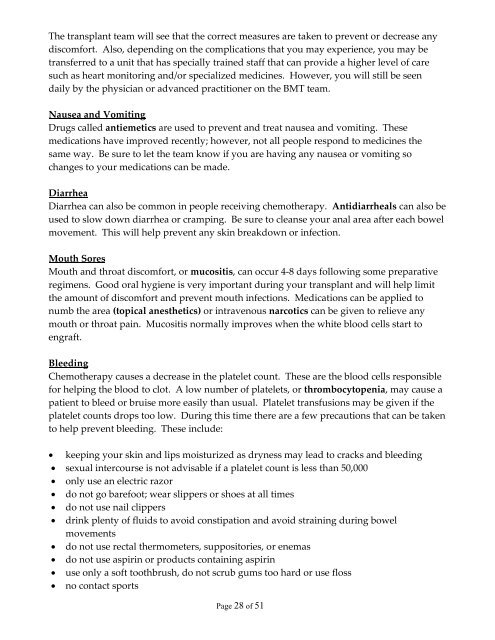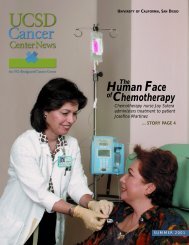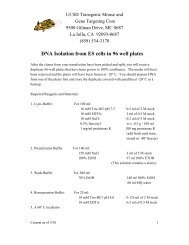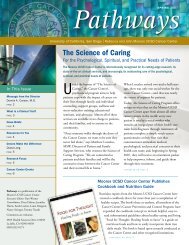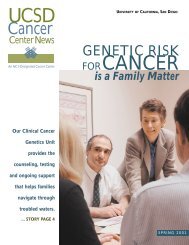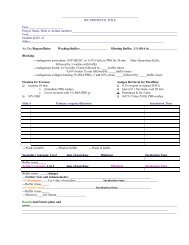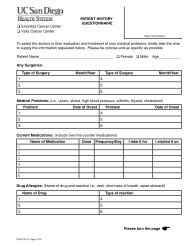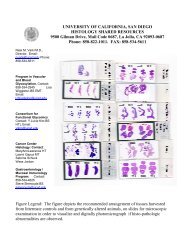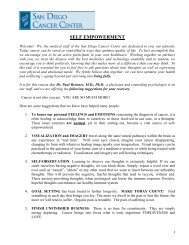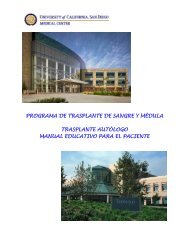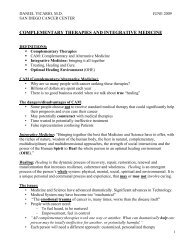Autologous Transplant Patient Education Manual - Moores Cancer ...
Autologous Transplant Patient Education Manual - Moores Cancer ...
Autologous Transplant Patient Education Manual - Moores Cancer ...
Create successful ePaper yourself
Turn your PDF publications into a flip-book with our unique Google optimized e-Paper software.
The transplant team will see that the correct measures are taken to prevent or decrease any<br />
discomfort. Also, depending on the complications that you may experience, you may be<br />
transferred to a unit that has specially trained staff that can provide a higher level of care<br />
such as heart monitoring and/or specialized medicines. However, you will still be seen<br />
daily by the physician or advanced practitioner on the BMT team.<br />
Nausea and Vomiting<br />
Drugs called antiemetics are used to prevent and treat nausea and vomiting. These<br />
medications have improved recently; however, not all people respond to medicines the<br />
same way. Be sure to let the team know if you are having any nausea or vomiting so<br />
changes to your medications can be made.<br />
Diarrhea<br />
Diarrhea can also be common in people receiving chemotherapy. Antidiarrheals can also be<br />
used to slow down diarrhea or cramping. Be sure to cleanse your anal area after each bowel<br />
movement. This will help prevent any skin breakdown or infection.<br />
Mouth Sores<br />
Mouth and throat discomfort, or mucositis, can occur 4-8 days following some preparative<br />
regimens. Good oral hygiene is very important during your transplant and will help limit<br />
the amount of discomfort and prevent mouth infections. Medications can be applied to<br />
numb the area (topical anesthetics) or intravenous narcotics can be given to relieve any<br />
mouth or throat pain. Mucositis normally improves when the white blood cells start to<br />
engraft.<br />
Bleeding<br />
Chemotherapy causes a decrease in the platelet count. These are the blood cells responsible<br />
for helping the blood to clot. A low number of platelets, or thrombocytopenia, may cause a<br />
patient to bleed or bruise more easily than usual. Platelet transfusions may be given if the<br />
platelet counts drops too low. During this time there are a few precautions that can be taken<br />
to help prevent bleeding. These include:<br />
keeping your skin and lips moisturized as dryness may lead to cracks and bleeding<br />
sexual intercourse is not advisable if a platelet count is less than 50,000<br />
only use an electric razor<br />
do not go barefoot; wear slippers or shoes at all times<br />
do not use nail clippers<br />
drink plenty of fluids to avoid constipation and avoid straining during bowel<br />
movements<br />
do not use rectal thermometers, suppositories, or enemas<br />
do not use aspirin or products containing aspirin<br />
use only a soft toothbrush, do not scrub gums too hard or use floss<br />
no contact sports<br />
Page 28 of 51


